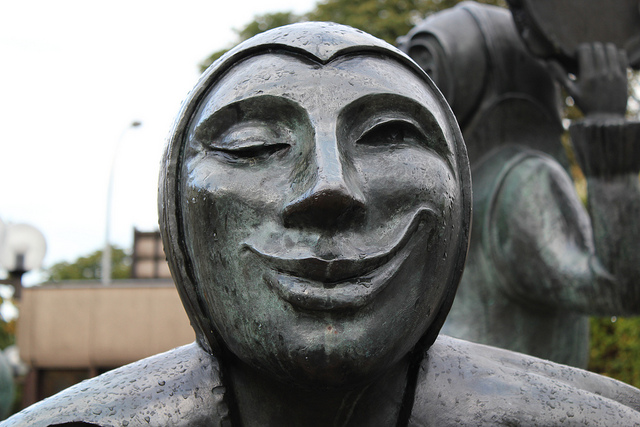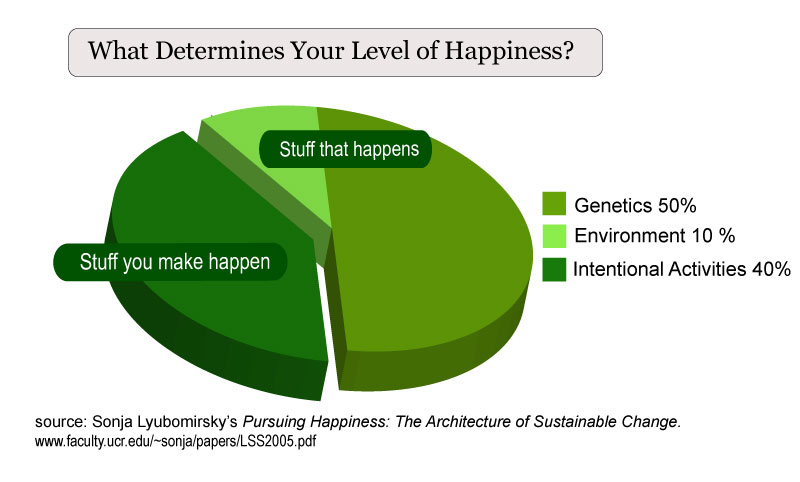
Imagine being able to alter your body weight by 40%.
Craziness, you say? Sure, it’s crazy, but people do it all the time (over a period of years).
Want to hear something even crazier?
Your level of happiness is kind of like your body weight.
Both have base levels set by genetics. Over a long period of time, both are affected to some degree by the choices you make.
The difference? You want one to increase and another to remain around the base level.
How much control do we have over our happiness?
According to Dr.Sonja Lyubomirsky, a Positive Psychology researcher at University of California Riverside, your level of happiness is determined by three factors: genetic (50%), environmental (10%, and intentional activities (40%).

While 60% percent of our level of happiness is determined by stuff that happens, either by birth or surroundings, the remaining 40% is mostly under our control.
The things we do, the habits we develop, and the decisions we make all conspire to affect our overall happiness.
Since the research shows we can increase our happiness, I’m conspiring with some PhDs (okay, just putting together some of their findings) to bring you research-proven ways to increase your happiness.
Before we go on, a caveat: I’m not saying unhappy people are always at fault for their unhappiness. These numbers don’t account for outliers. Some people experience trauma and loss so tragic they never recover.
However, I am saying that the vast majority of people have the capacity to develop and cultivate higher levels of happiness.
With all that in mind, let’s look at 7 PhD-approved, fat-free ways to increase your happiness.
1. Find Flow
I’ve gone on and on about Dr. Csikszentmihalyi’s research into peak experience, and with good reason: people report ridiculously high levels of happiness, well-being and satisfaction when they experience flow on a regular basis.
To experience flow, you need a stimulating task or activity that is goal-oriented, provides feedback, and is adequately matched to your skill level. Flow-inducing activities include things like conversing, programming, sporting, working, writing, drawing, performing, gaming, etc. Link to the book
2. Stay Focused
Two researchers from Harvard recently found that a wandering mind is an unhappy mind [link]. Using an iPhone app that sent questions to people throughout the day, they found that people were most happy when they were more intensely focused on their task, no matter what that task was.
Happily, anyone can increase their levels of focus & concentration with a little effort. Check out 16 Ways to Increase Focus. Freelance creative people might also try the Pomodoro Technique.
3. Live Near Happy Friends
Remember that study about how real-life social networks affected obesity rates? Happiness is kind of like that.
Dr. Nicholas Christakis of Harvard Medical School found that happiness was contagious in the same way, spreading among people who lived close in close proximity to each other.
Quantifying your chances of happiness is a tricky thing, but that didn’t stop the authors from doing so: for each happy friend you have, you increase your likelihood of happiness by 9 percent; unhappy friends decrease this by around 7%.
4. Increase Your Social Connections
According to a study published in 2006 in the American Sociology Review, 25% of Americans have no one to confide in, and people now have considerably fewer close friends than they did two decades ago. Facebook friends don’t count. This is troubling because people report higher levels of happiness when they’re with other people.
Yet, people are measurably happier when they’re with other people…even introverts receive a boost from frequent social connections. While getting out there can be tough for some people, the benefit is always greater than the cost.
5. Have more sex
Dartmouth researcher David Blanchflower found that going from having sex once a month to once a week was, as far as happiness levels were concerned, equivalent to receiving a $40,000 annual bonus.
Since this is as obvious as Day Glo camouflage , allow me to throw in something totally counter to popular perception: to get more sex, consider getting married. In 2006, the Lancet published findings concluding that married people have more sex than singles.
6. Practice Daily Gratitude
In 2003, the Journal of Personality and Social Psychology published research that confirmed what the major religions have known for thousands of years: consciously focusing on blessings and expressing gratitude makes people happier. Dr. Robert A. Emmons, one of the authors of the study, wrote in a later book that practicing daily gratitude can increase your happiness by 25%.
You can start by keeping a gratitude journal; everyday, or even once a week, simply write down three to five things you’re grateful or thankful for. If you do a weekly review, this would be a great time to do this.
7. Reevaluate Your Priorities
A group of researchers recently examined 25 years worth of survey data of 60,000 Germans with an eye towards what made them happy. The results were published in the Proceedings of the National Academy of Sciences.
Their findings? The happiest people were those who pursued goals related to altruism, family life, religion, health, and a happy work-life balance. The least happiest were those who pursued goals related to their careers or material success. Not surprisingly, having a neurotic spouse was also quite detrimental to long-term happiness.
Over to You
What can you add to this list? What have I forgotten? Have you used any of these ways to increase your happiness (If #5, no details, please)? Please drop me a line in the comments and let me know.
Please subscribe to Happenchance if you enjoyed this post.
photo credit: rigtor. I made the snazzy pie chart.

Comments on this entry are closed.
Thanks Seth – I really enjoyed the post. And the pie-chart is indeed snazzy.
It’s not often I stop to think about my happiness – it’s such a basic element to life, you’ve got to wonder why I don’t give it more thought. I guess I’m not alone, but that’s little comfort. Thanks again for helping me take the time to consider something outside my “norm”.
/Ian.
Hey Ian, thanks for stopping by. That was my first pie chart. Didn’t even realize I could make such things in Illustrator.
Happiness is funny like that; everyone wants to be happy, but how often do we make ‘increase happiness’ a priority? Very rarely. But I think it’s a goal most people can work towards.
As someone with a low genetic predisposition to happiness, I’ve thought about the topic of increasing happiness quite a bit over the years. After being miserable for a long time, I’ve finally made changes in the last 2 years which have had a huge impact on my happiness level. The biggest of these was deciding to live a healthier lifestyle. Before, I smoked and was very sedentary. Now that I’ve quit smoking (17 months now!), started eating a more healthy diet, and gotten to a point where I’m pretty physically active, I’d say that my happiness level has increased at least 50%.
I used to just assume that I was cursed with shitty genes and that I would never be happy. It’s amazing now, looking back, to think about how much some little changes have had an effect.
You’re right on, Trever. I didn’t mention it in the article, but I think being in good health makes it much easier to be happier. Not saying one is a requisite for the other, just that, when your brain has no oxygen and your body isn’t doing what it’s made to do (expend energy), you’re less likely to experience long-term happiness.
Trever, I too thought I was destined to live the “miserable” existence
that my parents have led. Choosing not to be a victim was important,
but I find that I still sabotage myself unknowingly. Learning to
forgive and not hold grudges has made a big difference in my joy level
and therefore, my happiness.
Choosing to live more of my life
outside myself has been revealing also. I had some pretty messed up
people in my life and now I attract more positive people because of the
attitude that I choose. There are still challenges and trials that
remain, but I refuse to be brought to my knees by them (unless it is in
prayer). My health needs to be a primary focus as I have recently had a
“mystery” illness that led to a job loss. How positive I remain
impacts all my decisions.
I saw a TED talk on youtube with a
woman who was not supposed to walk again after a serious injury. She
now walks and had a perfect score on a “happiness” quiz. Her secret:
starting each day with gratitude. I started researching this topic for a
college paper, but I can now see that it has a larger purpose of
placing my life on a new path.